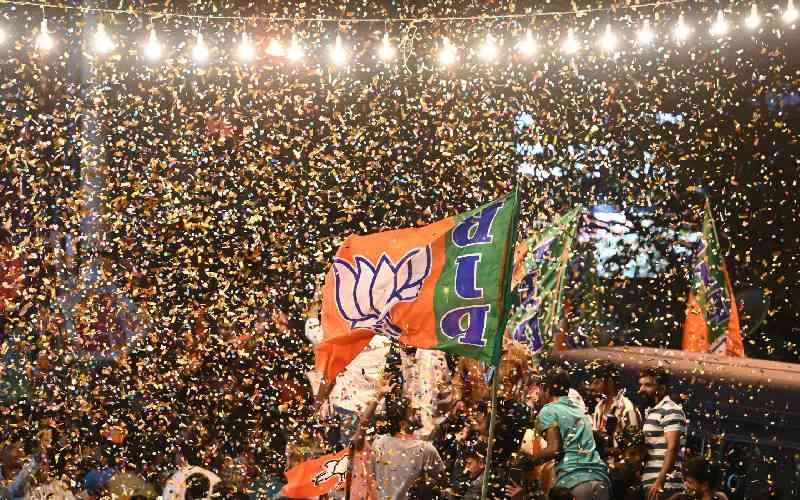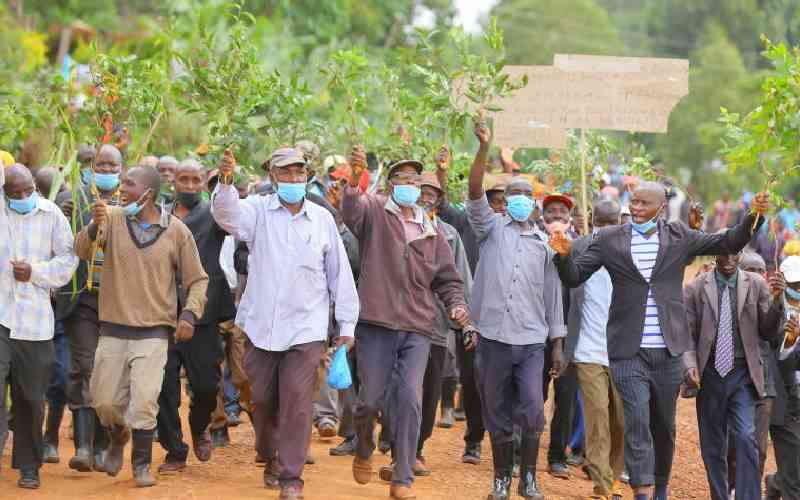As we mourn Senator Gerald Otieno Kajwang’ we shall always remember his rallying call in the struggle for the Second Liberation: bado mapambano, or a Luta Continua.
Those who have never known what the political trenches look or feel like may view Kajwang’s enthusiasm— and the vigour with which he called the youth not to relax or give up — as nothing more than theatre or mere amusement. But for those of us who are in the struggle and have been in it for the long haul, Kajwang’s voice lives, and it will not be silenced by trappings of power by those who win easy victories through trickery, corruption and manipulation of state organs such as the IEBC.
Earlier in the year, on May 18 and June 8, I wrote articles in this newspaper about the IEBC. I actually called the IEBC a rogue institution which, as currently constituted, is extremely dangerous to democracy and good governance in our country since the men and women who run it are corrupt, partisan, arrogant and very sly. I was aware, even before the last elections, that the leadership of IEBC was up to no good.
I remember how amazing it was for Franklin Bett, James Orengo, Janet Ongera and I to wait in the IEBC boardroom for a meeting with Isaack Hassan and his team. We had been sitting patiently with IEBC officials and commissioners for about 20 minutes waiting for Isaack to arrive. When he finally arrived he moved slyly into his chair, looked at us and said, rather disdainfully: “Oh yes. This is the ODM team: shoot!” The four of us looked at each other in disbelief. Always the diplomat Franklin Bett broke the ice with the words: “Mr Chairman, it may perhaps be better if we began formally with some introduction....”
Come to think of it we were then Cabinet Ministers for heaven’s sake. We were also honourable Members of Parliament—except for Ms Ongera—who voted the money that provided for Mr Hassan’s livelihood. More than that, all of us—except again for Janet—could have easily qualified as Hassan’s parents. In other words, when all was said and done, the young man should have treated us with some respect. Sheer etiquette required him to accord us some dignity in his office rather than command us to “shoot” as if we had gone there for some ping pong game.
But that disdain was merely a sign of the times. IEBC had become a trading house with kickbacks from contracts and tenders as the only things that mattered. Arriving there to discuss mundane issues of how well BVRs were going to work, how safe the IEBC was from being infiltrated by security organs of the state, etc was a waste of the chairman’s time. Hence for him we needed to have “shot” quickly to leave him to undertake other more serious business.
The donor agencies have been slow and reluctant to see this point. Having put a lot of resources into so-called capacity building programmes in the IEBC they are reluctant to accept that they provided capacity that built knaves, tricksters, money launderers, institution manipulators and legal wizards. The remotest product one can get from this type of an unfortunate investment is an independent electoral commission to manage democratic elections as we have in South Africa. I remember discussing this issue with one envoy who reassuringly reminded me that chairman Isaac Hassan and his team were then engaged in an “evaluation exercise” to correct mistakes experienced during the last elections. I was stunned how ignorant these envoys are regarding what had been going on in that institution.
The revelations in the London court were to be expected. And of course attempts to cover up will follow even with the support of some foreign powers anxious to hide their own role in the scandals of the last elections. If truth be told Kenya has had only two free and fair elections since independence. The first one was the independence elections in 1963 which KANU won and KADU accepted as free and fair. Soon after that the nationalist coalition created a broad based government in which KADU was included. The second one was the 2002 elections which NARC won. Again the government was broadly based on the principle of a national democratic coalition. In both instances the election managers did not have the opportunity to “trade with the fears of politicians in determining who wins” due to an overwhelming majority created before the electoral contest on the basis of a broad based nationalist coalition.
After the successes of both the 1963 and 2002 elections it is the presidential authoritarian system which completely messed up coalition building, and hence democratic governance, in Kenya. I want to advance the thesis that in culturally diverse societies like ours the presidential system of government based on majoritarian rule the Westminster style is no good. It is inimical to democratic governance. It invites corruption and intimidation in the electoral process, creating monsters like the present IEBC in its wake. It has a tendency of nurturing the politics of exclusion with terrible violent consequences when political elites mobilise their various ethnic bases to win the coveted prize of the presidency. In the final analysis it breeds bad governance and undermines development.
But the story would be different had we designed the making of our government differently when the Constitution was put together by Parliamentarians in Naivasha. Our intention all along was to do away with the presidential system of government and have a parliamentary system largely based on proportional representation. This would have tremendously reduced the tendency of the IEBC to be corrupt and would have enhanced its professionalism as it would have been managing a process and not manipulating a process to please an individual.
But it is never too late. We can still cut our losses and begin afresh. We need to see the life of our nation in a long term perspective. What we propose today should be good for our children and our grandchildren and not necessarily for ourselves. And this is where I differ with our previous presidents. They all had a great chance to build a great nation by creating institutions which should have brought Kenyans closer together. Rather than do that they went completely personal by giving priority to personal wealth and tribal power. But in terms of nation building and national values Kenyans will always weep in their memory with much regret.
 The Standard Group Plc is a
multi-media organization with investments in media platforms spanning newspaper
print operations, television, radio broadcasting, digital and online services. The
Standard Group is recognized as a leading multi-media house in Kenya with a key
influence in matters of national and international interest.
The Standard Group Plc is a
multi-media organization with investments in media platforms spanning newspaper
print operations, television, radio broadcasting, digital and online services. The
Standard Group is recognized as a leading multi-media house in Kenya with a key
influence in matters of national and international interest.
 The Standard Group Plc is a
multi-media organization with investments in media platforms spanning newspaper
print operations, television, radio broadcasting, digital and online services. The
Standard Group is recognized as a leading multi-media house in Kenya with a key
influence in matters of national and international interest.
The Standard Group Plc is a
multi-media organization with investments in media platforms spanning newspaper
print operations, television, radio broadcasting, digital and online services. The
Standard Group is recognized as a leading multi-media house in Kenya with a key
influence in matters of national and international interest.








